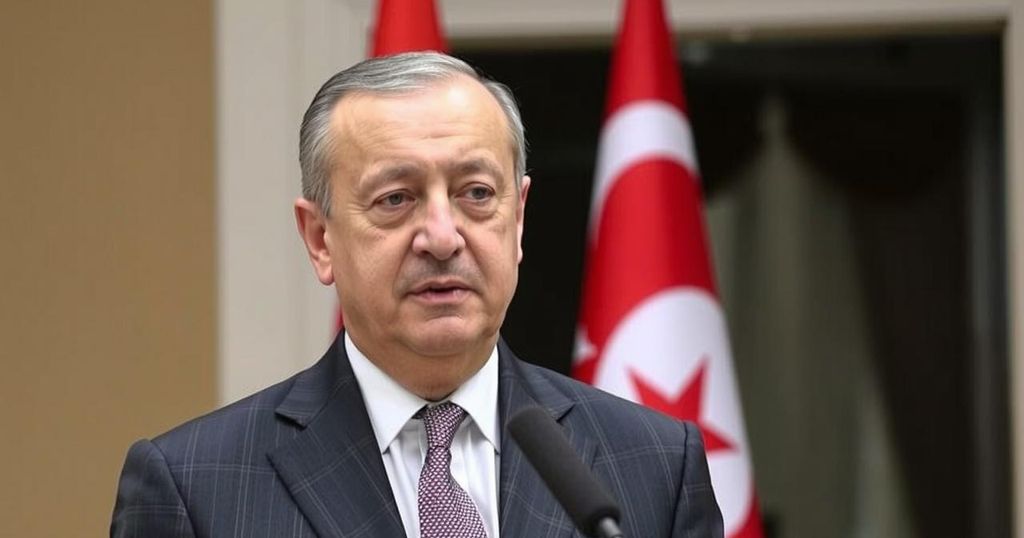Erdogan’s Visit to Cairo: A Focus on Syria and Regional Stability

President Erdogan of Turkey will visit Cairo to meet with President Sisi, focusing on Syria’s political landscape following the fall of the Assad regime. This visit highlights Turkey’s expanded influence in the region and the importance of Egypt’s engagement with Ankara amid concerns over Syria’s transitional government and the implications for regional stability. The discussions are expected to pave the way for bilateral cooperation in reconstruction and security strategies going forward.
Turkey’s President Recep Tayyip Erdogan is scheduled to visit Cairo to engage in discussions with Egyptian President Abdel Fattah el-Sisi, primarily focusing on the situation in Syria. This meeting occurs amidst growing apprehensions in Egypt regarding the new Syrian government following the collapse of Bashar al-Assad’s regime. Erdogan’s attendance at the upcoming D-8 summit in Cairo on December 19 will serve as a platform for these talks, as Sisi seeks assurance and collaboration from Ankara regarding the evolving political landscape in Damascus.
This visit is particularly significant given the historical context of Erdogan’s support for Syrian rebels since the Arab Spring of 2011. Notably, Turkey’s influence has expanded following the recent establishment of a transitional government by these rebels in Syria. Turkish officials confirm that Erdogan’s trip stems from Egypt’s invitation, extended before the fall of the Assad government, which emphasizes the urgency of direct dialogue between Ankara and Cairo as Egypt navigates its diplomatic strategy post-Assad.
Erdogan’s regional impact remains robust, as evidenced by the recent activities of Turkey’s intelligence head, Ibrahim Kalin, who engaged with Syrian rebel leaders in Damascus, thus reinforcing Turkey’s pivotal role in Syrian affairs. Furthermore, this meeting aligns with a series of regional diplomatic efforts, particularly aimed at stabilizing the aftermath of Assad’s regime. Iran’s involvement, as well as Egypt’s past as a battleground for influence between Turkey and other Arab states, adds complexity to the discourse.
The meeting between Erdogan and Sisi represents a crucial juncture in Middle Eastern geopolitics, indicating a potential shift in long-standing rivalries and a collective approach towards reconstruction and stability in Syria. As the landscape continues to evolve, the discussions in Cairo will likely shape future relations and strategic planning among the key players involved, including Turkey, Egypt, and Iran. The outcome may have lasting implications for broader regional stability and the management of rebel factions within Syria.
The impending meeting between Turkish President Recep Tayyip Erdogan and Egyptian President Abdel Fattah el-Sisi is set against a backdrop of substantial geopolitical transformations following the fall of the Assad regime in Syria. Since the Arab Spring in 2011, Turkey has been a staunch supporter of Syrian rebel forces, facilitating their operations against the Assad government, which significantly altered the power dynamics within the region. As Syrian opposition groups consolidate power and a new governing body begins to take shape, concerns among Arab states, particularly Egypt, have emerged regarding the trajectory of governance in Syria and its implications for regional security. Moreover, Iran’s influence in the region directly correlates with these developments, underscoring the complexity of Turkey-Egypt-Iran relations amid their historical rivalry. This meeting symbolizes a potential thawing of tensions and a new era of cooperation among these nations as they navigate a post-Assad landscape, particularly concerning Syria’s reconstruction efforts and stability.
In summary, President Erdogan’s forthcoming discussions with President Sisi in Cairo highlight the evolving nature of international relations in the Middle East, particularly regarding Syria’s new political reality. The stakes are high, with both leaders aiming to address security concerns and explore avenues for cooperation as the region grapples with the aftermath of the Assad regime’s collapse. This meeting is indicative of potential shifts in diplomatic strategies and alliances as Arab states increasingly seek to stabilize their neighboring environments while managing their own national interests far beyond mere diplomatic formalities.
Original Source: www.middleeasteye.net








